Sometimes the curtains are blue because the artist likes blue.
Sometimes the curtains are blue because the artist’s childhood bedroom had blue curtains and they subconsciously remind the artist of some aspect of their youth, but they’ve no idea that’s why they wanted to draw blue curtains as they were replaced with blinds when they were pretty young, and they’ve forgotten about having had blue curtains, so if asked, would say they just liked blue.
And sometimes the curtains are blue because the artist wanted a blue background for space curtains, but didn’t have enough time to add the stars, planets, spaceships and aliens.
For instance, in the first example the artist added a skull because it looked rad. But why did it look rad? What influences did the artist have that made skulls rad to them and not scary or beautiful or holy?
Also it doesn’t really matter what the author thinks as long as you can support an interpretation with some evidence. Richard Adams, for example, stated that Watership Down has no meaning and was just some bunny stories for his kids.
https://en.wikipedia.org/wiki/The_Death_of_the_Author?useskin=vector
So he just wanted to traumatize his kids - for fun!
…but I think that’s a good point. Once the work is out of the artists hands it lives a life of it’s own. It’s a pet peeve of mine when people start bickering and bitching “well no the song/book/movie means this and not that, dumbass, we have the artist on record saying so” like it means anything. I mean sure, it means something, but in the context of personal interpretation it’s pretty much meaningless unless it matters to the interpreter. There are so many layers to it and interpretations and how we experience any kind of works is subjective.
I got in this fight with a friend who had a painting created by another friend. It was skull, lighter, knife.
He asked me what it meant, and I don’t remember what I said… But he jumped up with this victorious expression and went “No! It means nothing, it’s just skull, lighter, knife. Other friend painted it, and”. I got into some death of the artist philosophy and he started to get pissed the more I insisted it doesn’t matter what the artist though, it’s what you get out of it. The artist had a snug smile behind the other guy
I got terrible grades in the essay portion of every AP lit test because my takes were different than the consensus. I just remember one of them where I tried to defend my take… But what I took out meant nothing to the author, but he insisted the critics were definitely way off
Here’s the thing - no one does anything for one reason, or even zero reasons. Artists usually don’t have a hidden message beyond the story structure - all creation is a reflection of the creator. There’s no arbitrary or random - humans aren’t capable of that.
It’s like looking at someone’s bedroom… There’s no version of a bedroom that says nothing about the occupant
Talking about death of the author, I think I came across the furthest possible extent of it
There’s an ancient Sumerian…joke? adage? parable? anecdote? That has gotten some attention in the usual places you’d imagine around the internet. Translated to English it says:
A dog walks into a bar and says “I can’t see a thing, I’ll open this one.”
It’s built like a joke, but if it was one the humorous element has been lost to time. No one gets it. Not even archaeologists. Hypotheses include:
-
It’s an aural pun for a language we no longer know how to pronounce. Imagine archaeologists in the year 6000 puzzling over “What’s black and white and red all over? A newspaper.” That joke already doesn’t work in written English because even a native English speaker might not get the pun if they first encountered the joke in print rather than spoken aloud, because the homophones aren’t spelled the same.
-
It’s a vocabulary pun that we no longer understand. “A man walks into a bar. The next man ducks.” Is just a non-sequitur unless you understand that the phrase “walks into a bar” means both “entered a drinking establishment” and “collided with a horizontal metal rod.” Does one or more of the words in the joke carry an additional meaning that has been lost to time?
-
It requires some cultural understanding that we lack. “A man walked into a wiring closet, and was shocked by what he saw.” If those future archaeologists reading this joke with no other context don’t understand what electricity is, it will be impenetrable to them. There is apparently a hypothesis that Sumerian bars doubled as brothels, so it’s a joke about a dog peeking at people fucking.
We talk about “death of the author” in terms of, the author meant something while writing the work, the work means something to the audience when they read it, sometimes these two meanings are different, which of the two meanings is correct/matters? People have read all sorts of meanings into the cockatoo screeching in Citizen Kane; in an interview Orson Welles says the cockatoo was there simply to wake up the audience. If you do find meaning there where none was intended, is that meaning valid?
The person who wrote the above joke has been dead twice as long as Jesus. We don’t know their identity and have no metatextual writings from them; no explanation of what this meant to them. We have no way to ask the author what he meant by this, and we don’t get the joke. We can read the text and understand its surface level meaning, and that’s it.
So…what now?
Cool story bro. I do mean that sincerely, it has the sort of energy that made me want to say that, but I am genuinely glad to have now heard that story, it’s pretty interesting
My first thought was it might be a non sequitur, but it seems like it has too much structure for that or to be the earliest recorded troll.
What I find fascinating is that we might find the answer - language has math, AI research has made us start looking at language as high dimensional shapes in information space. Turns out, not only do languages have a consistent rate of information expression when spoken, but there’s a common human shape to language
Having just a few examples of writing and distance in time makes it harder, but with the combinations of studying language evolution (they have shockingly clever methods with a solid mathematical basis) and the many things we’re learning about the math of language (now that we’ve discovered it’s incredibly important technologically)…
We might understand the joke one day, maybe even soon. Or maybe we won’t, because not enough information remains to definitely declare an answer. Or maybe this is the first troll, and over time more humans that had ever existed when the author wrote it will spend lifetimes trying to understand this weird, unsolved language puzzle.
Maybe, as humans grow in number and specialize more and more, this specific joke spawns multiple fields of study
Regardless, that dude was epic.
-
Art class was basically just me imaging what pretentious shit my teacher wanted to hear the most.
A review for a story I wrote involved the reader assuming I was making references to popular media that I didn’t intend at all and some were inspired by something else entirely.
I think this type of interpretation often indicates the state of mind of the audience member rather than the artist. It’s perfectly fine, but it might be more accurate to say, “when I see the artist’s blue curtains, it makes me think of…”
The fun part is that sometimes it is on purpose and sometimes it isn’t and I like seeing how people interpret both and what they get out of a work intentionally or not.
Exactly, tons of things have been born from, as Bob Ross would say, “happy little accidents”. I always highly encourage everyone to learn to, at least sometimes, embrace the mistakes and accidents that happen. Random accidents and chance are great spearheads for innovation and inspiration and can make something unique.
One time in kindergarten I colored the sky green because I’d lost my blue crayon.
[Actual artist, wanting to seem cool for a change] Yes. Totally painted that as a statement about materialism. Yes. That’s what’s up.
My 12th grade English teacher had a sign hanging in her classroom that said “He knew everything about literature except how to enjoy it.”
11th and 12th grade English classes, which were mostly focused on American and British literature respectively, came very close to putting me off reading entirely. Two solid years of having obsolete, stuffy, dull, usually mean spirited and miserable stories crammed down your throat, and the ideas and feelings you glean from these old pieces of shit are to be turned in for a grade. I got the distinct impression that my teachers were pushing their own personal ideas as objectively correct.
The novel that brought me back was Lincoln Child’s Utopia. It’s a book written in 2002 about some adventure plot set in a slightly futuristic amusement park. The main character had a daughter, a teenage girl, who had an mp3 player and was constantly listening to music. And it was that little detail that snapped me–a teenage boy who had an mp3 player and was constantly listening to music–back into liking books again. It felt so weird, and forbidden, and wonderful that there was someone like me in my time in a goddamn book. Oh yeah, books don’t have to be 150 years old and about miserable people making each other miserable!
It’s because old books are in the public domain so it is cheaper for schools to buy them in bulk.
I’m pretty sure the Hopper story is fake though
I assume everything I read here is fake, still funny though.
No way
Reminds me of a story about Jackson Pollock, don’t know if it really happened though or is just a joke.
At a Jackson Pollock exhibition, there was a group of art connoisseurs discussing one of his paintings where it was all black and gray except for one little streak of red. They were going back and forth saying what they all thought he meant by it. Was it the futility of man staring into the void, was it that even in darkness there is always hope, etcetera.
But then Jackson Pollock showed up and some one asked him and he told them, “Oh that? That happened when I was painting that one over there”
It’s kind of crazy to think that there’s a case to be made that Jackson Pollock is only as well known an artist as he is because he and other abstract expressionist artists were artificially promoted by the CIA worldwide to attempt to counteract the growth of Soviet realism and demonstrate the freedom of expression in the US.
“See? Even the guy who gets splatters of paint from one incomprehensible ‘art’ piece onto another can be successful in America!”
deleted by creator
It was also emphasizing that art like that couldn’t have been successful in Nazi Germany or Soviet Russia, which probably were true given the nationalized focus on cultivating culture (thanks a lot, Plato…).
I used to work for a company doing advanced screenings of movies. Usually someone who worked on the movie would be there for an interview after it finished screening. The audience questions are usually terrible. I’ll never forget the time Nash Edgerton was there to talk about The Square.
The movie’s plot hinged on one character missing a phone call. Someone in the audience (obvious film student/nerd) asked him if missing the call was “a social commentary on our relationship with technology.”
Nash says, “I don’t know man. Sometimes I just miss phone calls.”
This reminds me of probably my favorite digital art that I made when testing the art program that I now use all the time. It was my oc giger aiming his gun in some mountain range during a thunderstorm and it looks fricken sick to bad I forgot to draw his thumb so now his gun is just floating in his hand because I was forced on figuring what I can do with all the new brushes I had access to and my god I hate how the it all looks cool so long as you don’t focus on the amputated thumb
Why not just add the thumb?
Just change his backstory so he lost his thumb in a rogue shooting accident.
deleted by creator
All cigars are dicks, no exceptions.
I thought it was because the painting doesn’t show the whole diner? It cuts off on the right side, but it (the exit) would have to be over there (if it were a real place). Does a painting have to show every angle of a thing being painted?
The quote about the reporter appears to be fabricated, which is no great surprise.
ThatIsMighty should have just played it cool












